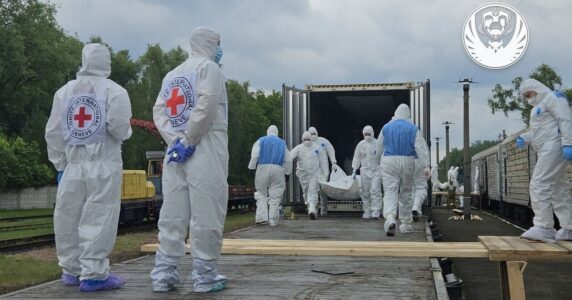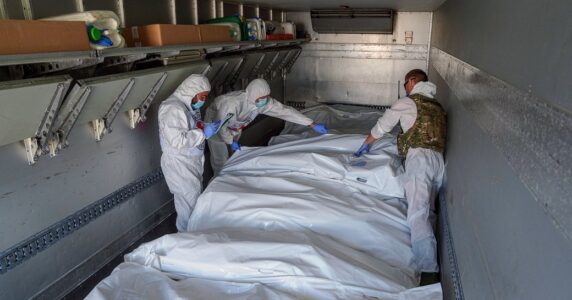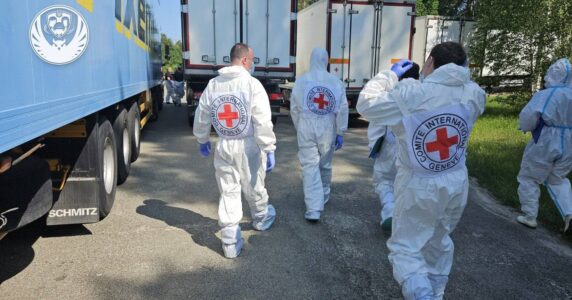Navigation and useful materials
Russia failed to either disrupt or downplay the significance of the international Crimea Platform, which aims, among other things, to protect the victims of Russian occupation. So, Russian propaganda reverted to its old “terrorist” narratives.
On September 3 this year, the Russian FSB detained entrepreneur Eldar Odamanov. Within a day, houses of four more Crimean Tatars were searched: brothers Aziz and Asan Akhtemov, Shevket Useinov, and Deputy Head of the Mejlis Nariman Jelal. The latter had returned from Kyiv a few days earlier, where he had taken part in the founding summit of the Crimea Platform.
The official reason Russia cited for detaining five Crimean Tatars was the explosion on a gas pipeline near the village of Perevalne, which had allegedly taken place on August 23. Jelal, the Akhtemovs, Odamanov and Useinov were all accused of diversion. Nariman Jelal will have to stay in custody for two months. He faces up to 15 years in prison under the Criminal Code of the Russian Federation. He is accused of terrorism and diversion against Crimean “authorities.”
Ukrainian human rights activists and officials attribute the Russian attack on Crimean Tatar activists primarily to the Crimea Platform summit on August 23. Before the summit, Russia had protested against it. The Kremlin called the event “a coven” and threatened that its participants would face consequences.
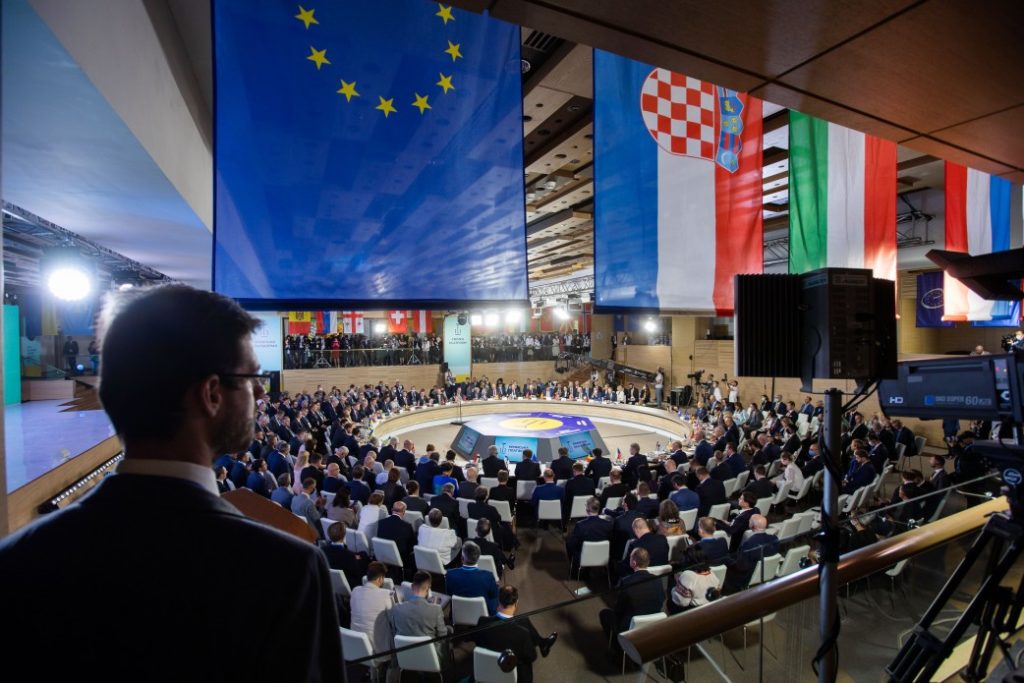
Oleg Sentsov was one of the first “Ukrainian terrorists” used by Russia to intimidate anyone who considered Crimea Ukrainian. According to the latest data, over the past 7 years, 127 people have fallen victim to politically motivated persecution in Russia and the occupied Crimea, at least 84 of them Crimean Tatars.
Crimean Tatars have been persecuted in Crimea since the very beginning of the occupation. Mass arrests and searches of activists in the occupied Crimea are either swept under the rug by the local and Russian media or are depicted as “the fight against terrorism.”
Political prisoners are most commonly charged with participation in a terrorist organization.
The “terrorist organization” in question is Hizb ut-Tahrir. It is a fundamentalist pan-Islamic organization which considers its purpose to unite all Muslim countries into the Islamic Caliphate, but they reject terrorist methods. Hizb ut-Tahrir has been banned in Russia since 2003, but in Ukraine and most countries across the world, it operates without restrictions.
According to Crimean Solidarity, 79 Crimean Tatars were imprisoned for alleged involvement in Hizb ut-Tahrir. Some of them are sentenced to 19 years in prison.
François Calvet, member of the European People’s Party, said at a PACE debate in June this year that the Russian authorities organized repressions against the Crimean Tatars under the pretext of fighting terrorism. The same hearing resulted in a resolution which once again attested to grave violations of rights and persecution of Crimean Tatars, human rights defenders, and journalists in Crimea due to the strict application of Russian legislation by the occupational authorities.
On September 2, 2021, the UN published the report of Secretary General António Guterres on human rights violations in Crimea and Sevastopol. This is the fifth report of the UN Secretary General on the situation in Crimea. It documents various violations of human rights and international humanitarian law on the occupied peninsula, for which none of those involved has been brought to justice.
Representatives of the Russian delegation to the PACE said that the June report of the French official was full of lies, and the information contained there was received from “terrorist organizations.”
Even before the September UN report was published, the official representative of the Russian MFA Maria Zakharova claimed that Russia actually protected the rights of Crimean residents against possible infringements committed by Ukraine, and the Russian senator from Crimea Sergey Tsekov called the document “highly unprofessional.”
Despite ample evidence of violations of international humanitarian law by the occupying authorities in Crimea, Russian Foreign Minister Sergei Lavrov continues to argue that human rights violations in annexed Crimea are untrue.
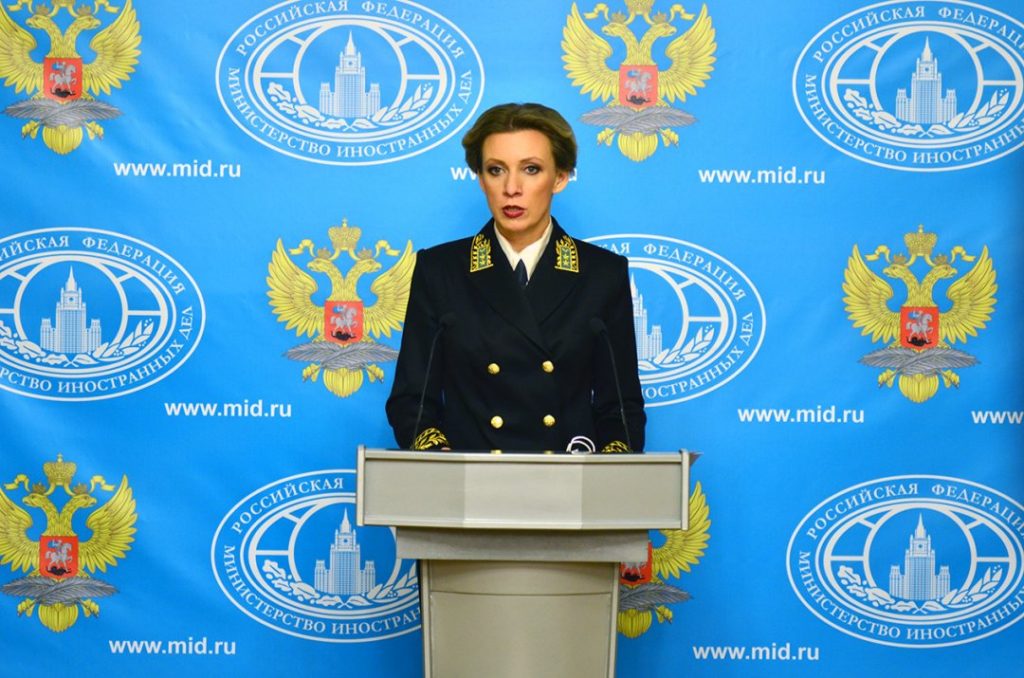
The Kremlin used the latest detentions to launch a broad propaganda campaign, accusing Ukraine of “acts of state terrorism.”
The FSB statement that the sabotage on the gas pipeline was organized by a territorial unit of the Main Intelligence Directorate of the Ministry of Defense of Ukraine in Kherson with the participation of the “Mejlis of the Crimean Tatar People,” an organization banned in Russia, was actively distributed with intimidating titles about terrorism. Representatives of the occupation authorities in Crimea made similar statements.
Later that week, Russian media cited information about the failure of a special operation during which “Wagner troops”—Russian war criminals—were to be detained in Minsk, as evidence of “state terrorism.”
Russia began promoting the idea of Ukraine being a terrorist country back in 2016.
At the time, pro-Kremlin media reported that the FSB had allegedly stopped terrorist acts in Crimea prepared by the Main Intelligence Directorate under the Ministry of Defense at critical infrastructural assets in Crimea in order to destabilize the social and political situation on the peninsula ahead of the elections. One example cited was the detonation on the Simferopol-Yalta highway.
Commenting on these statements, Vladimir Putin said, “Ukraine has resorted to the practice of terror in order to distract the people of Ukraine from the difficult economic situation in their country, from the individuals who seized power in Kiev and continue to plunder their own people.”
In the territories controlled by the occupier, there are regular publications with fake news alleging that Ukraine is at the top of the global list of terrorist countries and “shelters terrorists and coup d’état organizers.”
In April of this year, Nikolai Patrushev, Secretary of the Security Council of the Russian Federation, alleged that “Ukrainian special services and extremist organizations are constantly organizing provocations at the state border, making attempts at sabotage and terrorist actions in Crimea, especially at infrastructural assets.”
Throwing in mentions of Ukraine’s alleged external management, Patrushev claimed that with the support of the West, Ukraine had launched full-fledged training centers for diversionary and intelligence units, and the risk of terrorist attacks in Crimea was caused, among other things, by the return of militants from abroad to the peninsula who had fought in the ranks of international terrorists.
Russian lawyers were even cynical enough to cite international law—they said that the UN Charter gives them every right to “exercise force in order to exercise the right to self-defense in the event of an armed attack.” Lawyer Illya Remeslo said, “During its modern history, Russia has systematically encountered terrorists and has never left them unpunished. I think that Kyiv terrorists, who have completely crossed every line, hiding behind their Western masters, should be no exception.”
The subject of the alleged preparation for diversion in 2016 has been reanimated by Russian federal channels in the context of the current events—they are once again talking about Russia’s great mission to fight against terrorism in Ukraine.
In reality, however, it is Russia that directly meets the criteria for state terrorism. Back in 1987, the Geneva Conference on Terrorism adopted the Geneva Declaration on Terrorism, which defines state terrorism, among other things, as “police state practices against its own people to dominate through fear by surveillance, disruption of group meetings, control of the news media, beatings, torture, false and mass arrests, false charges and rumors, show trials, killings.” The definition also includes the supply of weapons of mass destruction by a state into the territory or territorial waters of other states or into international waters, military exercise maneuvers or war games conducted by one state in the vicinity of another state for the purpose of threatening the political independence or territorial integrity of that other state, and other.
Russia’s imaginary status as the fighter against terrorism also runs foul with its relations with actual terrorist organizations. For instance, after the Taliban terrorists seized power in Afghanistan, the Russian President’s special envoy for Afghanistan, Director of the Second Department of Asia Zamir Kabulov, reported intended contacts with the leadership of the terrorist organization. He noted that Russia had “good relations” both with the outgoing authorities and with the Taliban.
If you have found a spelling error, please, notify us by selecting that text and pressing Ctrl+Enter.
